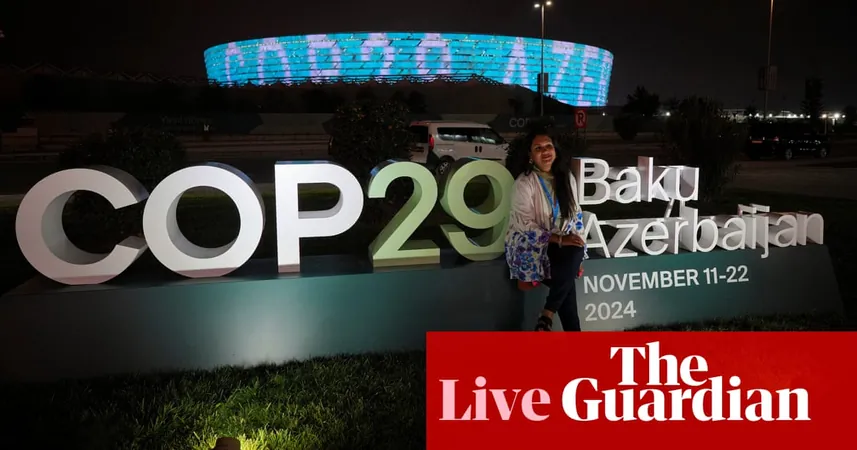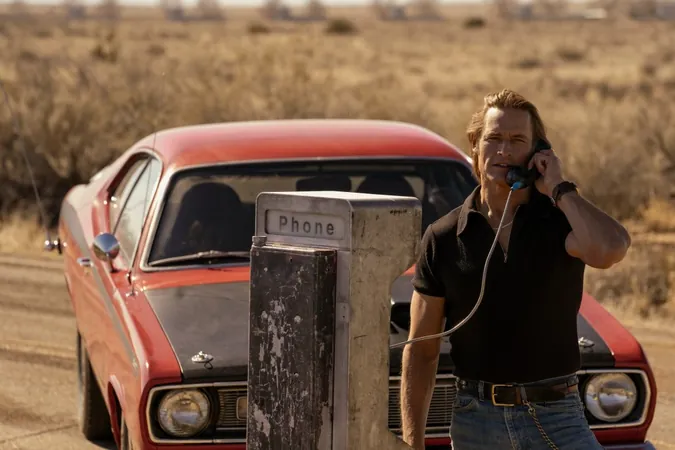
COP29 Breaks Deadlock on Carbon Credit Trading Rules Amid Protests and Warnings
2024-11-11
Author: Ting
COP29 Breaks Deadlock on Carbon Credit Trading Rules Amid Protests and Warnings
The first day of COP29 in Azerbaijan has seen significant yet controversial progress as diplomats approved key rules governing the trade of carbon credits, breaking a long-standing deadlock. However, this move has sparked fierce criticism from environmental activists and highlights the ongoing tension between climate negotiations and corporate interests.
Significant Progress and Controversy
In a day marked by both achievements and setbacks, COP29 kicked off with urgent discussions on carbon markets that have lingered unresolved for years. Delegates celebrated the greenlighting of new carbon credit trading rules, a decision made with little debate that has put the integrity of the negotiation process into question. Critics like Erika Lennon from the Center for International Environmental Law noted the procedural shortcomings, stating that approving these rules without thorough discussion sets a worrying precedent that could undermine support for the climate agreements already in place.
Environmental Advocates' Concerns
Environmental advocates, including Lise Masson of Friends of the Earth, have voiced their alarm, labeling the rush to pass Article 6 as a severe compromise to the summit's credibility. The implications of establishing a global carbon market, particularly for communities in the Global South and Indigenous populations, could lead to human rights violations and exacerbate existing environmental issues. They warn that carbon trading should not replace necessary climate finance owed to poorer nations.
WMO Warns of Rising Temperatures
The conference's opening day also shed light on the alarming trends in climate change. The World Meteorological Organization announced that the year 2024 is on track to become the hottest year on record, with average temperatures climbing significantly above pre-industrial levels. These rising temperatures are linked to both anthropogenic climate change and natural phenomena like El Niño, signaling urgent action is needed.
U.S. Commitment to Climate Actions
Interestingly, U.S. climate envoy John Podesta reaffirmed America’s commitment to combating climate change even if political leadership shifts with Donald Trump potentially returning to power. He emphasized that crucial climate progress, such as the Inflation Reduction Act, reflects a longstanding commitment to climate initiatives. Podesta outlined key focuses for COP29, including agreements on carbon trading practices and ensuring financial support for smaller economies most vulnerable to climate change impacts.
Protests Against Corporate Influence
As discussions progressed, protesters gathered outside BP's headquarters in London, decrying the company's role in climate destruction and their ties to oil extraction in Azerbaijan. Protest organizers voiced concerns about the corporate influence at COP29, calling out fossil fuel companies for profiting from environmental degradation while ignoring the climate crisis they help exacerbate.
Campaign Against Fossil Fuel Executives
In a surprising twist, the website cop29.com was rebranded by Global Witness to spotlight the role of fossil fuel executives in the climate crisis, further indicating the growing tension between climate advocacy and corporate interests. This campaign underlines a stark reality: while nations negotiate, corporations continue to profit from practices contributing to climate instability.
What Lies Ahead?
As the conference unfolds, the stakes are high: will COP29 yield meaningful progress on the climate front, or will it fall victim to CSR facades that seem to align with corporate greed? Activists and negotiators alike will be watching closely to see if true commitment translates into actionable change for our planet. As we enter the crucial days of COP29, the world remains hopeful yet skeptical about the outcomes of these critical negotiations.




 Brasil (PT)
Brasil (PT)
 Canada (EN)
Canada (EN)
 Chile (ES)
Chile (ES)
 Česko (CS)
Česko (CS)
 대한민국 (KO)
대한민국 (KO)
 España (ES)
España (ES)
 France (FR)
France (FR)
 Hong Kong (EN)
Hong Kong (EN)
 Italia (IT)
Italia (IT)
 日本 (JA)
日本 (JA)
 Magyarország (HU)
Magyarország (HU)
 Norge (NO)
Norge (NO)
 Polska (PL)
Polska (PL)
 Schweiz (DE)
Schweiz (DE)
 Singapore (EN)
Singapore (EN)
 Sverige (SV)
Sverige (SV)
 Suomi (FI)
Suomi (FI)
 Türkiye (TR)
Türkiye (TR)
 الإمارات العربية المتحدة (AR)
الإمارات العربية المتحدة (AR)